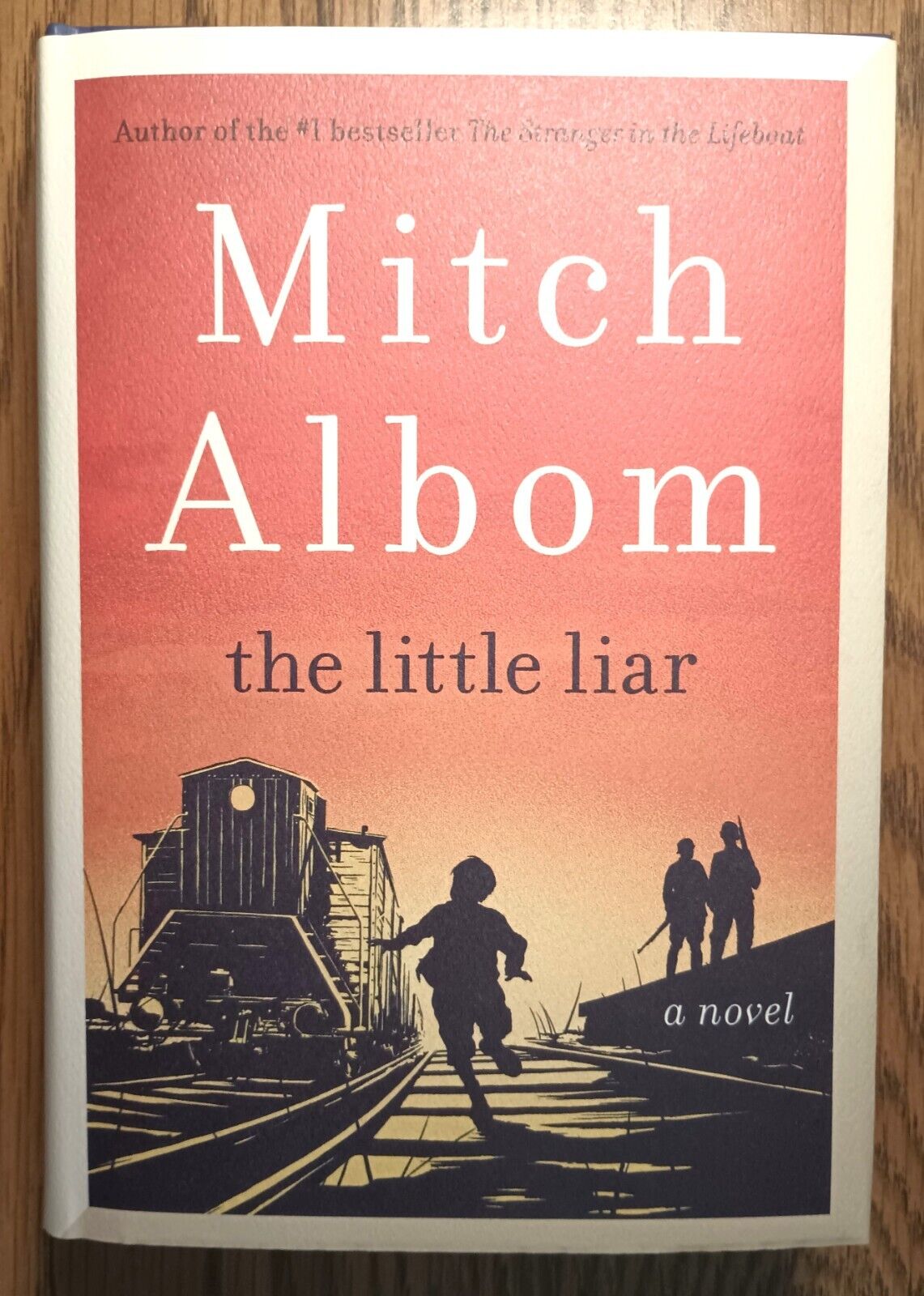Delving into Albom’s Wartime Narrative
Mitch Albom’s The Little Liar transports readers to WWII Greece, a land steeped in secrets and sorrow. Eleven-year-old Nico, the protagonist, tells small lies to navigate his difficult circumstances. As the Nazi occupation intensifies, his falsehoods escalate, blurring the lines between survival and deception. This review explores the novel’s themes, characters, and impact, ultimately considering whether The Little Liar is worth your time.
A Boy, a Lie, and the Shadow of War
Nico Krispis, an inherently honest boy, finds himself entangled in a web of deceit as Salonika, Greece, falls under Nazi rule. A seemingly insignificant lie takes on a life of its own, impacting not only Nico but his entire community. The Little Liar explores the ripple effect of this lie, raising questions about morality and resilience amidst chaos. It begs the question: what choices might we make under such duress? Would we have the courage to do what is right, even when gripped by fear? Embark on a journey through the captivating narrative of a splintered spark of dreams and discover the magic within.
Salonika: Before and After the Storm
Albom paints a vivid portrait of Salonika under German occupation, but the novel also prompts reflection on the vibrancy of life before war’s devastating intrusion. Imagining the bustling markets, the tight-knit community, and daily routines amplifies the tragedy of their loss. Delving into the history of Salonika’s Jewish community further enriches the narrative, providing essential context for Nico’s experiences.
Unraveling the Lie’s Impact
The crux of The Little Liar lies in Nico’s pivotal falsehood. What compels an honest boy to lie? Is it fear, desperation, or a more nuanced motivation? More importantly, what are the consequences? This unfolding mystery captivates the reader, prompting reflection on the profound impact of words, both intended and unintended.
Beyond Historical Fiction: Universal Truths
The Little Liar transcends the historical fiction genre, exploring universal themes of hope, guilt, forgiveness, and the enduring human spirit. Some may interpret it as a parable of choices made under pressure, while others may focus on the remarkable resilience of the human heart in times of darkness. The novel’s ambiguity invites individual interpretation, allowing readers to find personal resonance within its pages.
Echoes of Albom’s Familiar Themes
Readers familiar with Albom’s works, such as Tuesdays with Morrie and The Five People You Meet in Heaven, will likely recognize recurring themes of life, death, and purpose. The Little Liar continues this exploration, adding another layer to Albom’s ongoing contemplation of the human experience. This thematic consistency suggests a deeper philosophical thread connecting his diverse body of work.
Readers’ Responses: A Tapestry of Perspectives
Examining readers’ reactions illuminates the novel’s impact. Some connect with Nico’s courage, others with the historical setting, while still others find themselves contemplating guilt and redemption. These diverse responses underscore the book’s power to evoke personal reflection, challenging individual beliefs about truth and morality.
Is The Little Liar Based on a True Story?
While The Little Liar evokes the emotional realities of the Holocaust’s aftermath, it is a work of fiction, not a historical account. Published in 2023, it centers on Nico, a young Greek Jewish boy whose storytelling tendencies lead to increasingly complex lies in the wake of unimaginable tragedy. The narrative raises questions: are his lies simply coping mechanisms, or do they hold deeper meaning? This ambiguity, coupled with the intertwined stories of his brother Sebastian, their friend Fanni, and a shadowy former Nazi officer, fuels the novel’s intrigue.
Unlike Albom’s autobiographical Tuesdays with Morrie or the true story behind Have a Little Faith, The Little Liar uses a fictional narrative to explore the Holocaust’s psychological and moral complexities. Albom delves into survivor’s guilt, the struggle to process loss, and the conflicted desire for justice, acknowledging the difficult choices individuals faced. While not based on specific events, the novel likely draws inspiration from countless survivor stories, offering insight into the trauma’s lasting impact. Some experts believe fictional narratives can effectively convey such trauma, although they shouldn’t replace factual accounts. The Little Liar may inspire readers to further explore this historical period and its enduring legacy.
| Feature | Description |
|---|---|
| Genre | Fiction, Historical Fiction |
| Setting | Post-World War II Greece |
| Main Character | Nico, a young Greek Jewish boy |
| Themes | Holocaust, survival, guilt, revenge, redemption, lies, truth, memory, family, friendship, the impact of war |
| Author | Mitch Albom |
What is Mitch Albom’s Most Popular Book?
While The Little Liar offers a compelling narrative, Tuesdays with Morrie arguably remains Albom’s most recognized work. This memoir, recounting Albom’s final lessons from his former professor battling ALS, explores universal themes of love, loss, and the search for meaning. Its emotional depth likely fueled its international acclaim, solidifying its place in countless classrooms and book clubs. However, Tuesdays with Morrie represents just one facet of Albom’s literary contributions.
The Little Liar, narrated by “Truth,” delves into honesty, survival, and redemption through Nico’s wartime experiences. Its relative lack of widespread recognition compared to Tuesdays with Morrie may stem from the latter’s intensely personal connection with readers, transcending historical context. Some may find the wartime setting emotionally challenging, while Tuesdays with Morrie‘s philosophical reflections offer a more direct path to introspection.
Albom’s body of work, however, extends beyond these two narratives. The Five People You Meet in Heaven explores spiritual journeys, For One More Day examines second chances, The Time Keeper contemplates the nature of time, and The Magic Strings of Frankie Presto weaves a tale of music and destiny. Recurring themes of faith, family, and forgiveness permeate his diverse collection.
| Title | Genre | Themes |
|---|---|---|
| Tuesdays with Morrie | Memoir | Life, Death, Purpose, Forgiveness, Mentoring |
| The Five People You Meet in Heaven | Novel | Afterlife, Redemption, Unexpected Connections |
| For One More Day | Novel | Family, Regret, Second Chances |
| The Time Keeper | Novel | Time, Purpose, Humanity |
| The Next Person You Meet in Heaven | Novel | Afterlife, Connection, Human Relationships |
| The Magic Strings of Frankie Presto | Novel | Music, Destiny, Love, Storytelling |
It’s crucial to distinguish between popularity and critical acclaim. While Tuesdays with Morrie enjoys immense popularity, its critical reception is more nuanced, prompting discussions about literary merit versus accessibility. Ultimately, a book’s value lies in its personal connection with the reader. Exploring Albom’s diverse collection may lead you to discover your own favorite.
What Happened to Mitch Albom in 1995?
1995 proved a transformative year for Albom, marked by reconnecting with a dying mentor, a challenging professional dilemma, and a joyous marriage. These events intertwined, shaping his perspective and influencing his future work, especially Tuesdays with Morrie.
The catalyst was a chance encounter: Albom saw Morrie Schwartz, his former professor, discussing his ALS diagnosis on Nightline. This unexpected reunion sparked renewed connection, leading to a series of visits and profound conversations about life and death. These “Tuesday meetings” formed the heart of Tuesdays with Morrie.
However, 1995 wasn’t solely defined by this personal journey. Albom faced a professional dilemma: the Detroit newspaper strike. This forced him to choose between colleagues and providing for his family, adding complexity to an already emotional year.
Amidst this turmoil, a joyful milestone emerged: Albom married Janine. This personal event underscores that 1995 was not solely about loss but also embracing love and connection.
| Event | Significance |
|---|---|
| Morrie’s Diagnosis | Rekindled Albom’s relationship with his mentor |
| Nightline Appearance | Prompted Albom to reconnect with Morrie |
| Tuesdays with Morrie | Captured their profound discussions |
| Newspaper Strike | Presented a difficult ethical dilemma |
| Marriage to Janine | Added happiness amidst challenges |
1995 was a crucible for Albom, shaping him both personally and professionally. It wasn’t merely the year Tuesdays with Morrie was conceived; it was the year Mitch Albom, the writer and man, was truly forged. While much is known about this pivotal year, further biographical research might offer deeper insights into his internal struggles and triumphs.
- Unlock Your Potential: Words With Inspiration for Lasting Success - April 28, 2025
- Jesus Bible: Discover Jesus’s Story Throughout Scripture - April 27, 2025
- Don Luis: Unraveling the 16th-Century Virginia Mystery - April 27, 2025

















1 thought on “Mitch Albom’s The Little Liar: A Story of Survival and Redemption in WWII Greece”
Comments are closed.